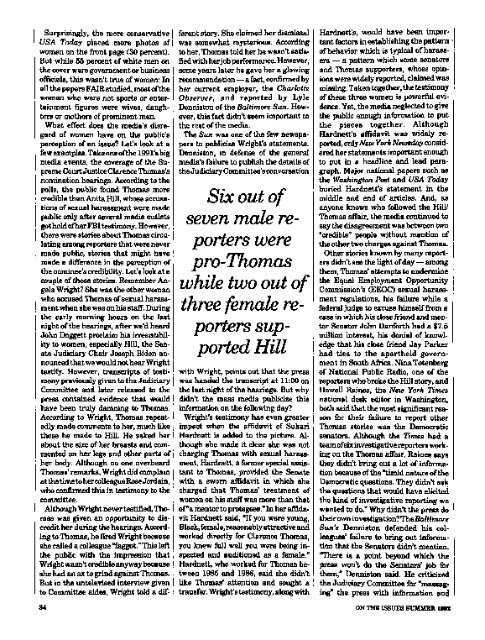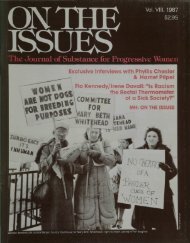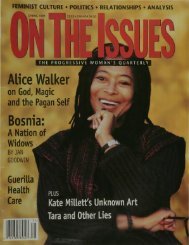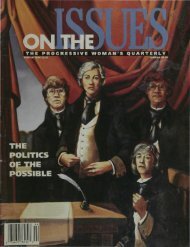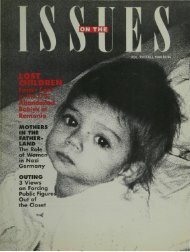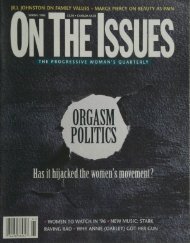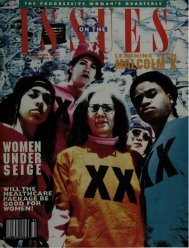300 Years & Counting 1H KILLS - On The Issues Magazine
300 Years & Counting 1H KILLS - On The Issues Magazine
300 Years & Counting 1H KILLS - On The Issues Magazine
You also want an ePaper? Increase the reach of your titles
YUMPU automatically turns print PDFs into web optimized ePapers that Google loves.
Surprisingly, the more conservativeUSA Today placed more photos ofwomen on the front page (30 percent).But while 55 percent of white men onthe cover were government or businessofficials, this wasn't true of women: Inall the papers FAIR studied, most of thewomen who were not sports or entertainmentfigures were wives, daughtersor mothers of prominent men.What effect does the media's disregardof women have on the public'sperception of an issue? Let's look at afew examples. Take one of the 1991's bigmedia events, the coverage of the SupremeCourt Justice Clarence Thomas'snomination hearings. According to thepolls, the public found Thomas morecredible than Anita Hill, whose accusationsof sexual harassment were madepublic only after several media outletsgot hold of her FBI testimony. However,there were stories about Thomas circulatingamong reporters that were nevermade public, stories that might havemade a difference in the perception ofthe nominee's credibility. Let's look at acouple of these stories. Remember AngelaWright? She was the other womanwho accused Thomas of sexual harassmentwhen she was on his staff. Duringthe early morning hours on the lastnight of the hearings, after we'd heardJohn Doggett proclaim his irresistibilityto women, especially Hill, the SenateJudiciary Chair Joseph Biden announcedthat we would not hear Wrighttestify. However, transcripts of testimonypreviously given to the JudiciaryCommittee and later released to thepress contained evidence that wouldhave been truly damning to Thomas.According to Wright, Thomas repeatedlymade comments to her, much likethose he made to Hill. He asked herabout the size of her breasts and commentedon her legs and other parts ofher body. Although no one overheardThomas' remarks, Wright did complainat the time to her colleague Rose Jordain,who confirmed this in testimony to thecommittee.Although Wright never testified, Thomaswas given an opportunity to discredither during the hearings. Accordingto Thomas, he fired Wright becauseshe called a colleague "faggot." This leftthe public with the impression thatWright wasn't credible anyway becauseshe had an ax to grind against Thomas.But in the untelevised interview givento Committee aides, Wright told a differentstory. She claimed her dismissalwas somewhat mysterious. Accordingto her, Thomas told her he wasn't satisfiedwith her job performance. However,some years later he gave her a glowingrecommendation — a fact, confirmed byher current employer, the CharlotteObserver, and reported by LyleDenniston of the Baltimore Sun. However,this fact didn't seem important tothe rest of the media.<strong>The</strong> Sun was one of the few newspapersto publicize Wright's statements.Denniston, in defense of the generalmedia's failure to publish the details ofthe Judiciary Committee's conversationSix out ofseven male reporterswerepro-Thomaswhile two out ofthree female reporterssupportedHillwith Wright, points out that the presswas handed the transcript at 11:00 onthe last night of the hearings. But whydidn't the mass media publicize thisinformation on the following day?Wright's testimony has even greaterimpact when the affidavit of SukariHardnett is added to the picture. Althoughshe made it clear she was notcharging Thomas with sexual harassment,Hardnett, a former special assistantto Thomas, provided the Senatewith a sworn affidavit in which shecharged that Thomas' treatment ofwomen on his staff was more than thatof "a mentor to protegees." In her affidavitHardnett said, "If you were young,Black, female, reasonably attractive andworked directly for Clarence Thomas,you knew full well you were being inspectedand auditioned as a female."Hardnett, who worked for Thomas between1985 and 1986, said she didn'tlike Thomas' attention and sought atransfer. Wright's testimony, along withHardnett's, would have been importantfactors in establishing the pattern *of behavior which is typical of harassers— a pattern which some senatorsand Thomas supporters, whose opinionswere widely reported, claimed wasmissing. Taken together, the testimonyof these three women is powerful evidence.Yet, the media neglected to givethe public enough information to putthe pieces together. AlthoughHardnett's affidavit was widely reported,only New York Newsday consideredher statements important enoughto put in a headline and lead paragraph.Major national papers such asthe Washington Post and USA Todayburied Hardnett's statement in themiddle and end of articles. And, asanyone knows who followed the Hill/Thomas affair, the media continued tosay the disagreement was between two"credible" people without mention ofthe other two charges against Thomas.Other stories known by many reportersdidn't see the light of day — amongthem, Thomas' attempts to underminethe Equal Employment OpportunityCommission's (EEOC) sexual harassmentregulations, his failure while afederal judge to excuse himself from acase in which his close friend and mentorSenator John Danforth had a $7.5million interest, his denial of knowledgethat his close friend Jay Parkerhad ties to the apartheid governmentin South Africa. Nina Totenbergof National Public Radio, one of thereporters who broke the Hill story, andHowell Raines, the New York Timesnational desk editor in Washington,both said that the most significant reasonfor their failure to report otherThomas stories was the Democraticsenators. Although the Times had ateam of six investigative reporters workingon the Thomas affair, Raines saysthey didn't bring out a lot of informationbecause of the "timid nature of theDemocratic questions. <strong>The</strong>y didn't askthe questions that would have elicitedthe kind of investigative reporting wewanted to do." Why didn't the press dotheir own investigation? <strong>The</strong> BaltimoreSun's Denniston defended his colleagues'failure to bring out informationthat the Senators didn't mention."<strong>The</strong>re is a point beyond which thepress won't do the Senators' job forthem," Denniston said. He criticizedthe Judiciary Committee for "massaging"the press with information and34 ON THE ISSUES SUMMER 1992


